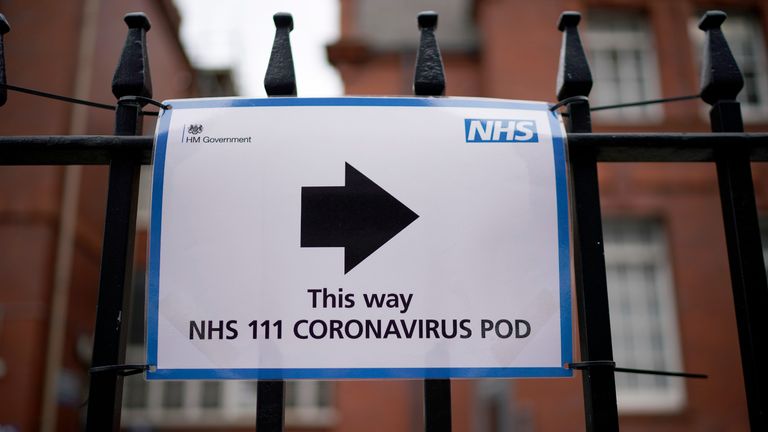Coronavirus: UK plans to buy antibody tests which may be 'gamechanger' in fighting COVID-19 spread
Antibody tests would help scientists refine estimates of how many people in the UK will be infected by COVID-19.
Friday 20 March 2020 09:14, UK
The government plans to purchase hundreds of thousands of antibody tests to detect if someone has already had coronavirus - in what could be a "gamechanger" in the UK's response to the outbreak, Boris Johnson said.
The prime minister said negotiations are currently ongoing and the kits could be bought if the tests prove effective in revealing who has had COVID-19 already and can therefore return to society.
The human body produces antibodies to fight infection, so by measuring antibodies in the blood, doctors can detect whether someone has had the infection previously.
Public Health England (PHE) said understanding who has previously had COVID-19 will allow it to refine its estimates of how many people in the UK will be affected and the rate of spread.
Testing on those with suspected coronavirus will also be "massively increasing", with NHS staff a priority, the prime minister said.
He said daily testing will rise "from 5,000 a day, to 10,000 to 25,000 and then 250,000".
In his now daily coronavirus briefing, Mr Johnson said: "To give you an idea of what is coming down the track, we're in negotiations today to buy a so-called antibody test, as simple as a pregnancy test which can tell whether you have had the disease and it's early days, but if it works as its proponents claim, then we will buy literally hundreds of thousands of these kits as soon as practicable.
"Because obviously it has the potential to be a total gamechanger."
An antibodies blood test is currently being developed by PHE which is analysing blood samples from people who have recovered from COVID-19.
By Thursday afternoon there were 3,269 confirmed cases in the UK, and 144 deaths from the virus.
The Department of Health said 64,621 people have been tested, with 61,352 confirmed as negative.
PHE expects the antibody test to play a major role in being able to keep track of infections, with 1,500 tests a week at first.
Chief medical officer for England Professor Chris Whitty said on Thursday: "On the antibody tests we should be clear that although we're confident there will be antibody tests, we're not absolutely confident yet about whether the ones that are currently on the market are the right ones and that needs to be tested out.
"And that's something that is an absolute priority for Public Health England.
"But once we have these, the key thing for in the first case health care workers and then other workers and members of society, we'll be able to say to somebody, you've had this virus, you're not likely to get it again at least in the immediate term, and now we can be confident you can return to work and now we can be confident you don't need to be taking some of the precautions you've been taking to date."
But he said "there will be a while before we've actually got this in large enough numbers" and it is "more useful" the further along in the outbreak.
The prime minister also said British scientists are expecting to start trials for the first coronavirus vaccine within a month.
Chief scientific adviser Sir Patrick Vallance said the first patient enrolled on the trial on Thursday, and it will start in mid-April.
Those behind the vaccine have been given permission to commence human trials before animal tests are complete, the Guardian reported, in a bid to accelerate the development process.
Permission was granted after similar vaccines developed for other diseases were proved safe in human trials.
Professor Adrian Hill, head of the Jenner Institute at Oxford, told the Guardian: "We are conscious that a vaccine is needed as soon as possible and certainly by June-July when we expect a big peak in mortality.
"This is not a normal situation. We will follow all standard trial safety requirements but as soon as we have a vaccine that's working we anticipate there will be an accelerated pathway to get it deployed to save lives.
"The more vaccine we can provide the sooner the better."
:: Listen to the Daily podcast on , , ,
Mr Johnson also said he is "absolutely confident that we can send coronavirus packing in this country" and the tide can be turned within the next 12 weeks.
He said this could only be achieved if members of the public heed the government's stay at home and social distancing advice.
However, he said he could not guarantee that by the end of June the peak would be on a "downward slope" - but promised restrictive measures "would be finite".









